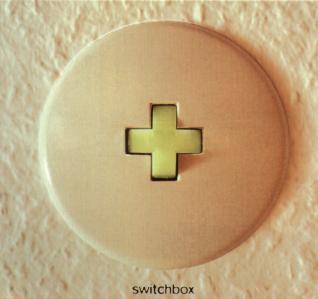
Frank Schulte
SWITCHBOX
 |
|
|
sold out
|
nml 9421 CD 1994 60'
|
| Anna Homler | vocals, toyinstruments |
| Frank Gratowski | reeds |
| Thomas Heberer | trumpets |
| Axel Otto | soundtable, toys, tapes |
| David Moss | drums, vocals, electronics |
| Jon Rose | vocals, electronics |
| Andres Bosshard | tapemachinery, computer, matrixsoundediting |
| Frank Samba | drums |
| Otomo Yoshihide | turntables, electric guitar |
| Dieter Manderscheid | double bass |
| Frank Schulte | synths, sampler, tapes, records, vocals, conductor |
The concept behind SWITCHBOX , as described above by FRANK SCHULTE , is the network of various musical „households" based on electronic circuits in different times and places. Schulte has explored the functions of high voltage networks in big cities, leading to field recordings done at high voltage transformer stations. Moreover, he’s also interested in traffic as a point of intersection of different speeds as well as daily sources of disturbance and interruption: phones, door bells, faxes - things that suddenly lead to new dimensions in time and place. This has led to a network of diverse musical ideas as well as stylistical characters, which Schulte likes to define in it’s highest quality as a household. FRANK SCHULTE lives and works in Cologne/Germany. In his diverse projects he’s always interested in the dialogue with international musicians and performers. In his work he also focusses on electronic media, concerning the creation, treatment and transmission of sound.
"... is an exception in the contempory stagnant free-jazz pond. A possibility to rise above the boundaries of clicheed improvisation through improvisation itself. With a tremendous number of sound sources (samplers,tapes,turntables,toys) and instruments Schulte slips out of the jazz coat into a free zone (with chunks of Industrial, Musique Concrete or Electro-Acoustic), and a radio-play type of assemblage which takes pleasure in sound and the superimposing of sounds is created." (Martin Büsser, Testcard 1)
"Those at the 24th Moers Festival know roughly what to expect: the positive to euphoric responce that Frank Schulte and his growing number of musicians got underlines the excitement created by this unusual project. Not an ad hoc free improvising combo, but a successful attempt to pursue a musical dialogue away from the common clichees and pigeon-holes."